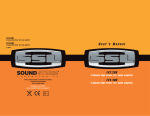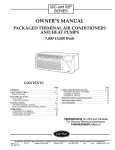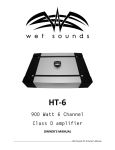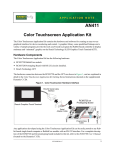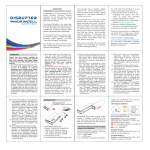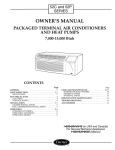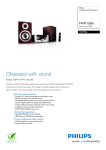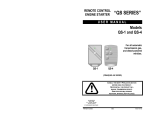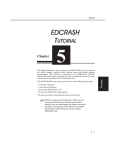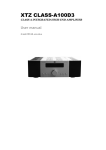Download Sa-8.2 - Cadence
Transcript
Sa-8.2 8˝ Super Compact Bass Enclosure With 2 Channel Amplifier Output User's Manual QSA8.2 8˝ Super Compact Bass Enclosure With 2 Channel Amplifier Output USER'S MANUAL Congratulations on your purchase of a CADENCE amplified subwoofer. It has been designed, engineered and manufactured to bring you the highest level of performance and quality, and will afford you years of listening pleasure. Thank you for making CADENCE your choice for car audio entertainment! 1 Page CONTENTS 2 Introduction 2 What is included? 2 Features 3 General precautions 3 Protection circuitry 4 Mounting the subwoofer 4 Connecting the subwoofer 6 Front panel controls and features 7 Rear panel controls and features 8 Low Level Input Wiring 8 Output / High Level Input Wiring 9 Power Connections 10 Remote level control connection 10 Specifications 11 Troubleshooting Introduction What is included? With the QSA8.2, we are introducing a low-profile amplified subwoofer. Low enough to easily fit below the seat of your car, this system offers you a quick and easy way to add a high-powered subwoofer system to your audio system. When first unpacking your new amplified subwoofer, please check first that the package contains all of the items below. if something is missing, contact the store where you purchased the product. * Amplified subwoofer The integrated amplifier features both high pass and low pass crossovers, and a control for adjusting the input sensitivity from 0.2v to 6v. * Remote subwoofer level control * Remote subwoofer control cable * Output / High level input harness/wire * Mounting hardware Both high level (speaker level) and low level (RCA type) inputs are present, making this a universal solution for use with any head unit or other input source. Features Your new Amplified subwoofer features the following: For further flexibility in the use of the subwoofer, a variable bass boost control has been included. You can control the subwoofer level with the remote level control module. * MOSFET PWM (Pulse Width Modulated) Power Supply * Thermal, overload and speaker short protection * Soft turn-on circuit * Remote turn-on/turn-off circuit * Variable input gain control * Variable low and high pass crossovers * Variable bass boost (0 to 18dB) * Variable phase shift (0 or 180 degree) * RCA low level and high level inputs * Auto Power On: ON/OFF * LED power and protection indicators * Remote subwoofer level control 2 General precautions Protection circuitry Before installing and using your new CADENCE amplified subwoofer , please become familiar with all the information contained in this manual. The built-in amplifier incorporates special protection circuitry which will disable the amplifier if any of the following should occur: Please keep this manual in a safe place for future reference. * Input overload * Do not open or attempt to repair this unit yourself. Dangerous high voltages are present which may result in electric shock. Refer any repairs to a qualified service technician. * Extremely high temperatures * Short circuit If any of these conditions is detected, the amplifier will go into a self-preservation mode, and the PROTECT LED on the control panel will glow in RED color. * To avoid risk of electronic shock or damage to the unit, do not permit any of this equipment to become damp or wet from water or drinks. If this does occur, immediately unplug the power wires and send the product to your local dealer or service center as soon as possible. What should I do if the POWER STATUS LED turns RED? If you observe that the POWER STATUS LED IS RED, please check the system carefully to determine what has caused the protection circuit to engage. * If there is smoke or any peculiar odor present during use or if there is damage to any of the component enclosures, immediately unplug the power cord and send the product to your local dealer or service center as soon as possible. To reset the amplified subwoofer when it is in PROTECT mode, turn off the power to the system (usually by turning off the head unit or other signal source which feeds the amplifier) and then turn it on again. SHOCK HAZARD! Do not open the case of this product. There are dangerous voltages present within the unit. There are no user-serviceable parts within the unit. If the internal amplifier has shut down due to thermal overload, you should first allow it to cool down before restarting. If the shut down was due to either an input overload or a short circuit, be sure to correct these conditions before attempting to power up the subwoofer again. 3 Mounting the subwoofer Connecting the subwoofer 1. Find a suitable location in the vehicle in which to mount the amplifier. A typical location is shown below: Before doing any wiring, look through this manual and identify the diagrams to follow for power, input and speaker connections for your particular installation. Be sure you understand all the connections before you proceed. Vehicle seat REMOTE LEVEL SUB SONIC BASS BOOST LPF PHASE 1. Connect the ground terminal to the closest point on the chassis of the vehicle. Keep this ground wire to less than 39" (100cm) in length. Use 8 gauge (or heavier) wire. POWER(GREEN) PROTECT(RED) 2. Connect the remote terminal to the remote output of the head unit using 16 gauge (or heavier) wire. 2. Make sure there is sufficient air circulation around the inteded mounting location. 3. Connect an empty fuse holder within 18" (45cm) of the car battery, and run 8 gauge (or heavier) cable from this fuse to the amplifier location. 3. Mark the location for the mounting hole screws by positioning the cabinet where you wish to install it. Make a small mark to identify the position and remove the unit. 4. Check that the fuse holder is empty. Then connect the fuse holder to the "BATT+" connection on the amplifier. Thoroughly clean the area you plan to attach the subwoofer, using a vacuum cleaner. 4 5. Connect all line inputs and outputs (if used) using high-quality cables. Connect all speakers, following the diagrams in this manual. Be sure to observe proper polarity to avoid audio phase problems. Don't misuse the level control! Do not mistake the input level control for a volume control! It is designed ONLY to match the output level of your audio source to the input level of your subwoofer. 6. Insert fuse(s) into battery fuse holders. 7. Recheck all connections before powering up the subwoofer. Do not adjust this input level to maximum unless your input level requires it. 8. Set all level controls to minimum position, and set all crossover control/switches to the desired frequency points. Ignoring these instructions will result in an input overload to the amplifier and excessive audio distortion. It can also cause. the protection circuit to engage. 9. Power up the head unit and the subwoofer. Then set the volume control on the head unit to about 3/4 volume, and adjust the subwoofer's input level controls to just below the level of distortion. 10. Further fine tuning of the various controls may be necessary to obtain best results. 5 Front panel controls and features 10 Sa-8.2 1 2 8˝ SUPER COMPACT BASS ENCLOSURE WITH 2 CHANNEL AMPLIFIER OUTPUT 3 4 5 6 1 REMOTE LEVEL CONTROL PORT 2 7 8 9 7 LOW- PASS FILTER Attach the included remote level control to control the volume level of the subwoofer independently. The LOW- PASS rotary potentiometer permits the setting of the low-pass filter value. 4 INPUT GAIN CONTROL The selected value defines the frequency until which the signal is amplified. After you have installed your system, turn this control to minimum. 8 PHASE SHIFT Turn the head unit on (and the subwoofer will turn on via the remote connection). Turn the head unit volume to about 2/3 full level. Use this switch to help compensate for time alignment problems in the system. Such problems usually result from having the subwoofer at a different distance from the listener than the other speakers in the system. Slowly turn up the subwoofer input gain control until you hear a small amount of distortion. Then reduce the level until the distortion is completely gone. Leave the control at this setting. 9 POWER STATUS LED When the LED is green, it means the amplifier is on and it’s working correctly. When the LED is red,it means the amplifier is in protection mode and there is a problem (overheating, wrong wiring, etc.). 3 HI - PASS : The HI-PASS rotary potentiometer permits to adjust the high-pass filter value (the amplification is ensured up to the selected value). 10 AUTO POWER ON The AUTO POWER ON (ON / OFF) is for high level (speaker-level) connections. When the switch is in the "ON" position, the amplifier will AUTO POWER ON when there is signal input. If the amplifier detects no signal input, the amplifier will auto turn off delay Several minutes. If you prefer to use the remote turn on/off connection, the switch is in the OFF position. 5 SUBSONIC FILTER Use this control to filter out low frequency noise and rumble. 6 BASS BOOST The bass boost rotary potentiometer permits to increase the bass level from 0 to +18dB. 6 Rear panel controls and features Sa-8.2 1 1 POWER TERMINALS 2 FUSE The fuse is rated at 30A. Do not use a fuse with a different value and NEVER replace the fuse with a wire or coin. 2 3 4 4 LOW LEVEL RCA INPUTS Low level inputs are the recommended way to introduce the audio signal to the subwoofer if RCA outputs are present on your head unit or other signal source (such as a sound processor). 3 OUTPUT/HI LEVEL INPUT The output / high level terminal permits for high-level signal in. It also allows for the amplified signal to be sent to your system speakers (left part :OUTPUT) for a true 2.1 system. If you are using the RCA inputs (low level) you must disconnect the high-level plug on the cable beam in order to achieve the 2.1 system (2x50W RMS). CAUTION: you must respect this order, if not you might damage the product. 7 Low Level Input Wiring Low-level (RCA) input wiring is preferred for best audio performance. Most trunk or hatchback installations will require a 15-20 feet RCA cable, while pickup trucks and under-seat installations will require a 6-12 feet RCA cable. Always use a high quality cable. NOTE: Do not connect BOTH the high level and low level inputs from your receiver to your amplifier at the same time! Sa-8.2 GREY R+ GREY / BLACK R- OUTPUT / High Level Input Wiring L+ WHITE L- WHITE / BLACK To Audio outputs of head unit. The high level input(s) should only be used when your receiver lacks RCA outputs. If the RCA outputs are not present, connect the speaker outputs from the receiver to the high level input connector of the amplifier. Be sure to observe polarity to avoid audio phase problems. NOTE: Do not connect BOTH the high level and low level inputs from your receiver to your amplifier at the same time! BLACK WIRING METHOD A Sa-8.2 WHITE L+ WHITE / BLACK LGREY R+ L+ Green L- Green / BLACK R+ Purple GREY / BLACK R- R- Purple / BLACK 8 To Speaker Terminals of head unit WIRING METHOD B BLACK Sa-8.2 L+ Green / BLACK WHITE / BLACK L+ L- Green WHITE L- NOTE: You may not hear any any sound when using option A with older head units. If that is the case please change speaker phase as per option B. GREY / BLACK R+ GREY R- R+ Purple / BLACK R- Purple To Speaker Terminals of head unit Power Connections Sa-8.2 FUSE Chassis ground point NOTE: In this connection, the Battery to REMOTE TURN-ON terminal of head unit AUTO TURN ON switch is in the OFF position. Sa-8.2 FUSE If you use high level inputs, AUTO TURN ON switch should be in the “ON” position. The unit will automatically turn on when there is signal input. If the unit detects no signal it will remain off. Battery Chassis ground point 9 Remote Level Control Connection Sa-8.2 Remote Level Control 8˝ SUPER COMPACT BASS ENCLOSURE WITH 2 CHANNEL AMPLIFIER OUTPUT Install the remote control securely under the dash or in a similar location where using it will not distract the driver. Specifications MODEL: QSA8.2 RMS power STEREO SUB 2x75W@4Ohm 100W@2Ohm THD <0.4% <0.1% Signal-to-noise ratio >90dB >100dB Frequency response 20Hz - 150Hz 50Hz - 20KHz Input sensitivity, high level 0.8V 1.0V Input sensitivity, low level 180mV 200mV Low Pass Filter 50Hz - 150Hz / Bass Boost 0 to + 18dB / Subsonic Filter 20Hz - 50Hz 50Hz - 150Hz(HPF) Load 4-8 Ohm 2 Ohm Fuse rating 30A Subwoofer 8inch Dimensions(L x W x H) mm 344 x 250 x 68 All specifications subject to change without notice. 10 Troubleshooting If you experience operation or performance problems with this product, compare your installation with the electrical wiring diagram on the previous pages. If problems persist, read the following troubleshooting tips which may help eliminate the problems. SYMPTOM POSSIBLE REMEDY Amplifier will not power up Check to make sure you have a good ground connection. Check that the Remote Input (Turn-On) has at least 3VDC. Check that there is battery power on the (+) terminal. Check that there is at least 12v. Check the fuse, replace if necessary. Make sure that the Protection LED is not illuminated. If it is lit, shut off the amplifier briefly, and then repower it. Protection LED comes on when amplifier is powered up Check for short circuits on speaker leads. Turn down the volume control on the head unit to prevent overdriving. Remove speaker leads, and reset the amplifier. If the Protection LED still comes on, then the amplifier is faulty and needs servicing. No output Check that all fuses are OK. Check that the unit is properly grounded. Check that the Remote Input (Turn-On) has at least 3V DC. Check that the RCA audio cables are plugged into the proper inputs. Check all speaker wiring. Low output Reset the Level Control. Check the Crossover Control settings. High hiss in the sound Disconnect all RCA inputs to the power sub's control panel. If the hiss disappears, then plug in the component driving the amplifier and unplug its inputs. If the hiss disappears at this point, go on until the faulty/noisy component is found. It is best to set the amplifier's input level control as low as possible. The best subjective signal-to-noise ratio is achieved in this manner. Try to set the head unit as high as possible (without distortion) and the amp input level as low as possible. Squealing noise is present Check for improperly grounded RCA interconnects. Distorted sound Check that the Input Level Control is set to match the signal level of the head unit. Always try to set the Input Level as low possible. Check that all crossover frequencies are properly set. Check for short circuits on the speaker leads. Amplifier gets very hot Check that the minimum speaker impedance for the amp model is correct. Check that there is good air circulation around the amp. In some applications, it may be necessary to add and external cooling fan. Engine noise (static type) This is usually caused by poor quality RCA cables, which can pick up radiated noise. Use only the best quality cables, and route them away from power cables. Engine noise (alternator whine) Check that the RCA grounds are not shorted to the vehicle chassis. Check that the head unit is properly grounded. 11













